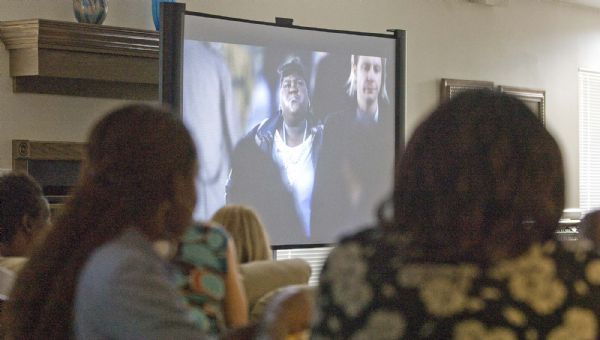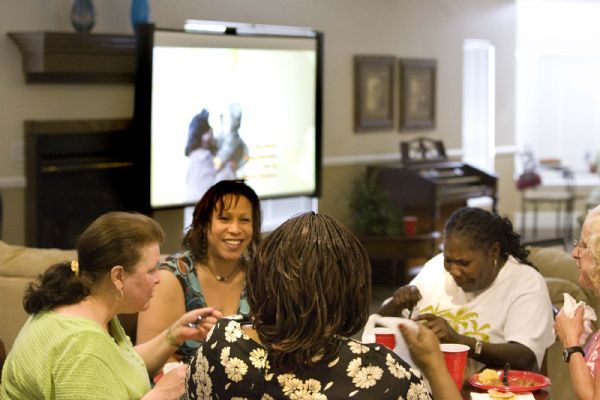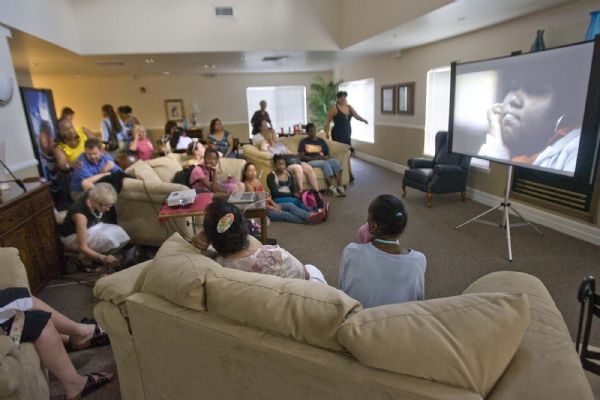This is an archived article that was published on sltrib.com in 2010, and information in the article may be outdated. It is provided only for personal research purposes and may not be reprinted.
The 2009 film "Precious" is about an illiterate, obese 16-year-old whose life if filled with abuse, incest, vulgarity. Just the kind of movie you show to a church group on a Friday night, right?
The Rev. Nurjhan B. Govan, pastor of Salt Lake City's Trinity A.M.E. Church, thought so. That's why she and her friends at Trinity put together a dinner theater on a recent Friday, serving catfish, coleslaw, beans and corn bread before screening the graphic, raw film.
Afterward, a panel discussed the spiritual and societal messages of the movie with the 25 who attended, 15 of them from Rescue Haven, a Christian-based shelter for abused or addicted women in Salt Lake City.
"There are some social, significant and redemptive aspects of the film that really have not been appreciated," said Govan, whose congregation is the oldest black church in Utah.
The film, which premiered at the 2009 Sundance Film Festival, winning the Audience Award and the Grand Jury Prize for best drama, went on to garner six Oscar nominations. It is based on the 1997 novel Push , by an author who goes by one name: Sapphire.
It's the story of Claireece "Precious" Jones. She lives in a Harlem tenement with her mother, who abuses Precious and the welfare system. At 16, Precious is pregnant for a second time as a result of rape by her own father, her mother's boyfriend. Her grandmother is rearing her first child, who has Down syndrome.
Precious, who often escapes into fantastical daydreams, begins to read and write after moving to an alternative high school. In the end, she severs ties with her mother and is determined to rear her two children and to get her graduate-equivalent diploma.
While some critics blast the book and film as perpetuating unflattering stereotypes of blacks, University of Utah professor Wilfred Samuels said the story actually is part of a 300-year literary tradition.
"I see this as a story of triumph," he told the group gathered for the screening. Samuels, an associate professor of English and ethnic studies, teaches from the book.
Catherine Stokes, a retired public health nurse and administrator who worked in Illinois, said no one should waste energy fretting about racial issues in the film. Incest, she noted, "exists in every racial group and every socioeconomic group and it is ugly wherever it is."
While the book and film carry no overt references to deity, Samuels, Stokes and the third panelist -- KayLynn Boone, administrator of Rescue Haven -- found the spiritual message implicit.
Stokes saw the fact that Precious was 16, twice impregnated by her father, as a sad comment on society's failure to intervene.
"People don't want to engage, and that is so contrary to a God-fearing people," said Stokes, who is a Mormon. "The Preciouses of this world ... we cross paths with, the issue is how not to look away. We are not isolated entities. We need each other."
Boone said the movie, which she called "a big-screen story of what's happening out there," can be especially powerful in reaching women who have suffered abuse and addiction.
"Many can be healed through this film because it exposes that potential [for healing]."
Indeed, one of the women from Rescue Haven said the film echoed something she is just beginning to grasp: "It's never too late."
She described herself as age 51 and a lifelong addict. "That's the hope I have: it's not too late."
Brenda Johnson, a member of Salt Lake City's Unity Baptist Church who attended the dinner theater, said she felt drawn to the character of Precious' mother, as vile as she was.
"Not only do we need to think about the Preciouses of the world, we have to think about the mothers of the Preciouses."
That character, Samuels said, holds a key to understanding the Christian character of the novel and movie.
In the penultimate scene, Precious' mother breaks down while trying to explain to a social worker why she treated her daughter as she did.
"She is saying, 'Who will love me?' " Samuels said. That's the need of every human heart.
"The biblical call is all about love," he said. "It is all about love."
Trinity African Methodist Episcopal Church, the oldest black congregation in Utah, is raising money to help restore its 103-year-old building in downtown Salt Lake City.
The Rev. Nurjhan B. Govan, pastor, says the church, 239 E. 600 South, needs $165,000 to reconstruct the basement social hall, which now is unusable because of mold contamination and foundation erosion. The church also hopes to acquire commercial-grade kitchen appliances and furnishings for the basement.
Friends of Trinity is an interfaith group raising money for the project. More information is available at 801-355-1527 or 801-531-7374.







